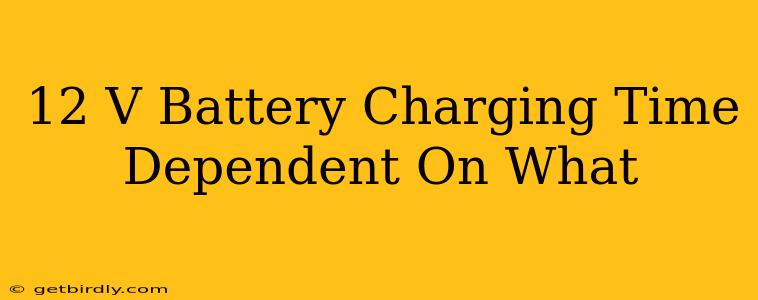12V Battery Charging Time: Dependent on What?
Charging a 12V battery isn't a simple case of plugging it in and waiting a set amount of time. The charging time varies significantly depending on several interconnected factors. Understanding these factors is crucial for ensuring your battery charges safely and efficiently, maximizing its lifespan, and preventing damage. This comprehensive guide will delve into the key elements influencing 12V battery charging time.
What Factors Determine 12V Battery Charging Time?
Several interconnected variables influence how long it takes to fully charge a 12V battery. Let's break them down:
1. Battery Capacity (Amp-hours or Ah):
This is perhaps the most significant factor. A battery's Ah rating indicates how many amps it can deliver for one hour at its rated voltage. A higher Ah rating means a larger capacity battery, requiring more time to charge. A 50Ah battery will naturally take longer to charge than a 20Ah battery, all other factors being equal.
2. Battery Type:
Different battery chemistries charge at different rates and have different charging characteristics.
- Lead-acid batteries (flooded, gel, AGM): These are common in cars, boats, and other applications. They generally have slower charging times than other types and require specific charging profiles to prevent damage. AGM (Absorbent Glass Mat) batteries, while still lead-acid, often charge faster and more efficiently than flooded lead-acid batteries.
- Lithium-ion batteries: These are becoming increasingly popular due to their higher energy density and faster charging capabilities. They generally charge much quicker than lead-acid batteries, but require specialized chargers designed for their specific chemistry.
3. State of Charge (SOC):
The initial SOC dramatically affects charging time. A nearly depleted battery will naturally take much longer to charge than one that's already partially charged. A battery at 20% SOC will charge faster than one at 0%.
4. Charger Output (Amperage):
The charger's amperage rating (in amps) directly impacts charging speed. A higher amperage charger delivers more current, leading to a faster charging time. However, using a charger with too high an amperage can damage the battery. Always choose a charger with an amperage rating appropriate for the battery's specifications.
5. Ambient Temperature:
Extreme temperatures (both hot and cold) can significantly slow down the charging process and even damage the battery. Ideal charging temperatures usually fall within a specific range, typically specified by the battery manufacturer. Charging in extreme cold or heat should be avoided if possible.
6. Charger Type:
Different chargers utilize different charging algorithms. Some chargers employ faster charging methods (like constant current/constant voltage charging), while others use slower, gentler approaches. Smart chargers are designed to adapt their output based on the battery's condition and temperature, optimizing the charging process and extending battery life.
7. Battery Age and Condition:
Older or damaged batteries might charge slower or not accept a full charge. Sulfation (build-up of lead sulfate crystals) in lead-acid batteries significantly impairs their ability to accept a charge. A battery's internal resistance also increases with age, slowing down charging.
How Long Does It Typically Take?
There's no single answer to how long it takes to charge a 12V battery. However, here are some general guidelines:
- Small, low-capacity lead-acid batteries (e.g., 7Ah): Might charge in a few hours with an appropriate charger.
- Larger, high-capacity lead-acid batteries (e.g., 100Ah): Could take 10-20 hours or more, depending on the charger's output and the battery's state of charge.
- Lithium-ion batteries: Can charge significantly faster, often in a few hours, but this varies greatly depending on the battery's capacity and the charger used.
Frequently Asked Questions (FAQs)
Can I overcharge a 12V battery?
Yes, overcharging can damage a 12V battery, potentially leading to overheating, reduced lifespan, and even explosion in some cases (especially with lead-acid batteries). Always use a charger designed for the specific battery type and monitor the charging process. Smart chargers help prevent overcharging.
What are the signs of a bad 12V battery?
Signs of a bad battery include slow charging, difficulty starting an engine (in automotive applications), reduced runtime on devices, swelling, or leakage.
How can I prolong the life of my 12V battery?
Proper charging, avoiding deep discharges, and storing the battery in a cool, dry place are crucial for maximizing its lifespan. Regular maintenance checks are also recommended.
What is the best charger for a 12V battery?
The "best" charger depends on the specific battery type and application. Look for a charger that's compatible with your battery's chemistry and has features like overcharge protection and temperature compensation.
This article provides a comprehensive overview of the factors that affect 12V battery charging time. Remember to always consult your battery and charger manuals for specific instructions and recommendations. Understanding these factors ensures you charge your 12V battery safely and efficiently, extending its lifespan and ensuring optimal performance.

